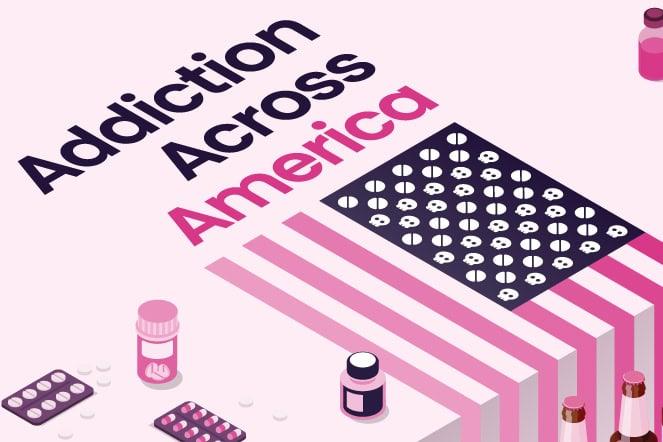Alcohol Dependence
Get valuable insights into Alcohol Dependence, including its causes, symptoms, prevention strategies, and treatment options, while also learning about how you can lower the cost of the medications used to treat Alcohol Dependence.

MEDICAL INFORMATION
Alcohol Dependence Key Facts
Related Medications
What is the definition of alcohol dependence?
Alcohol dependence, also known as alcoholism or alcohol use disorder (AUD), is a chronic medical condition characterised by a compulsive and uncontrollable craving for alcohol. It manifests in excessive alcohol use. The American Psychiatric Association’s Diagnostic and Statistical Manual of Mental Disorders (DSM–5) integrates alcohol abuse and alcohol dependence, into a single disorder called alcohol use disorder (AUD) with mild, moderate, and severe sub-classifications.
Alcohol use disorder is a serious public health issue with significant physical, psychological, and social consequences. Here, we provide you with a comprehensive overview of alcohol dependence, including its causes, symptoms, diagnostic criteria, and treatment options. Understanding the complexities of alcohol dependence is crucial for healthcare professionals to effectively identify and manage this condition, and for individuals and their families to seek appropriate support and treatment.
What are the causes and risk factors of alcohol dependence?
Alcohol dependence is a complex condition influenced by various factors, including genetic, environmental, and individual factors. While the precise causes of alcohol dependence are not fully understood, several risk factors contribute to its development. Here are some common causes and risk factors associated with alcohol dependence
Genetic Factors
Family History: Individuals with a family history of alcohol dependence and excessive or heavy drinking are at a higher risk of developing the condition. Genetic factors play a role in vulnerability to alcohol dependence, although specific genes involved are still being studied.
Environmental Factors
- Peer Influence: Social and peer pressure can contribute to the development of alcohol dependence, especially during adolescence and young adulthood
- Family Environment: Growing up in a family with a high prevalence in the use of alcohol or experiencing family conflict, parental alcoholism, or a lack of parental support can increase the risk
- Cultural and Societal Factors: Cultural norms and societal acceptance of alcohol consumption, including binge drinking, can influence alcohol dependence risk
Psychological and Psychiatric Factors
- Co-occurring Mental Health Disorders: Individuals with underlying mental health conditions such as depression, anxiety, bipolar disorder, or post-traumatic stress disorder (PTSD) may have an increased risk of alcohol dependence as a form of self-medication
- Stress and Coping Mechanisms: High levels of stress, traumatic experiences, or poor coping strategies can contribute to alcohol dependence as individuals turn to alcohol as a means of escape or stress relief
Neurochemical and Neurobiological Factors
- Brain Chemistry: Alcohol affects the brain’s reward system, leading to the release of dopamine, a neurotransmitter associated with pleasure and reinforcement. Over time, this can lead to the development of alcohol dependence
- Neuroadaptation: Prolonged alcohol use can result in neuroadaptations in the brain, altering neurotransmitter function and leading to dependence
Age and Gender
- Early Onset: Starting alcohol use at a young age, particularly during adolescence, increases the risk of developing alcohol dependence later in life
- Gender Differences: Men tend to have a higher prevalence of alcohol dependence compared to women, although the gap is narrowing. Biological, psychological, and societal factors contribute to this difference
6. Socioeconomic Factors
Lower socioeconomic status, unemployment, and limited access to education or healthcare can increase the risk of alcohol dependence.
It is important to note that while these factors contribute to the development of alcohol dependence, individual experiences and circumstances may vary. Alcohol dependence is a complex interplay of multiple factors, and not everyone with risk factors will develop the condition. Seeking professional help and support is crucial for individuals at risk or struggling with alcohol dependence to effectively manage and overcome the condition.
What are the symptoms and clinical presentations of alcohol dependence?
Craving and Preoccupation
- A strong desire or compulsion to consume alcohol, often with an overwhelming urge for a drink
- Frequent thoughts or preoccupation with obtaining and consuming alcohol, which may interfere with daily activities
Loss of Control
- Difficulty limiting the amount of alcohol consumed or unsuccessful attempts to cut down or quit
- Inability to control the duration and frequency of drinking episodes
- Drinking larger amounts of alcohol or drinking for a more extended period than intended
- Experiencing blackouts
Tolerance
- Developing tolerance to the effects of alcohol, requiring increased amounts to achieve the desired effect
- Needing more alcohol to feel the same level of intoxication previously experienced with lesser amounts
Withdrawal Symptoms
- Experiencing physical and psychological symptoms when alcohol consumption is reduced or stopped
- Common withdrawal symptoms include tremors, sweating, anxiety, irritability, nausea, insomnia, headaches, and in severe cases, hallucinations and seizures
Continued Use Despite Negative Consequences
- Persisting in alcohol use despite experiencing adverse effects on physical health, mental health problems, relationships, work, or legal issues
- Neglecting or reducing participation in social, occupational, or recreational activities due to alcohol use
Escalating Alcohol Consumption
- Gradual increase in the quantity and frequency of drinking alcohol over time
- A pattern of progressive loss of control over drinking behavior
Physical Health Issues
Alcohol dependence can lead to a range of physical health problems, including liver disease (such as cirrhosis), cardiovascular complications, gastrointestinal issues, pancreatitis, and compromised immune function.
Psychological and Behavioral Changes
- Mood swings, irritability, agitation, and depression
- Cognitive impairment, memory loss, and difficulty with concentration and decision-making
- Engaging in risky behaviors while under the influence of alcohol, such as driving under the influence (DUI) or engaging in unsafe sexual practices
Social and Interpersonal Consequences
- Strained relationships with family, loved ones, friends, and colleagues due to alcohol-related behaviours
- Social isolation, withdrawal from previously enjoyed activities, and reduced productivity at work or school
It’s important to note that the severity and presence of these symptoms can vary among individuals with alcohol dependence. A professional assessment by a healthcare provider or addiction specialist is crucial to diagnose alcohol dependence accurately and develop an appropriate treatment plan.
What is the treatment approach to alcohol dependence?
The treatment approach for alcohol dependence typically involves a combination of interventions aimed at helping individuals overcome their dependence and stop drinking, achieve sobriety, and improve their overall well-being. The specific treatment plan may vary depending on the severity of alcohol dependence and individual needs. Here are common components of the treatment approach for alcohol dependence:
Detoxification
Medically supervised detoxification helps individuals safely withdraw from alcohol and manage alcohol withdrawal symptoms. This process may take place in a hospital, specialised detoxification facility, or outpatient setting.
Behavioral Therapies
- Cognitive-Behavioral Therapy (CBT): Focuses on identifying and modifying maladaptive thoughts, beliefs, and behaviors associated with alcohol use, promoting coping strategies, and developing relapse prevention skills
- Motivational Enhancement Therapy (MET): Aims to enhance motivation and commitment to change alcohol use behaviors through personalized counseling and goal-setting techniques
- Contingency Management: Uses positive reinforcement strategies to encourage sobriety and adherence to treatment goals through rewards or incentives
Medications
- Disulfiram: Creates an aversive reaction when alcohol is consumed, discouraging its use
- Naltrexone: Reduces alcohol cravings and blocks the pleasurable effects of alcohol
- Acamprosate: Helps individuals maintain abstinence and manage post-withdrawal symptoms
Supportive Care and Counselling
- Individual Counselling: Provides a safe and confidential space for individuals to explore underlying issues, develop coping strategies, and gain support in their recovery journey
- Group Therapy: Engaging in group sessions with peers facing similar challenges provides mutual support, encouragement, and shared experiences
- Family Therapy: Involving family members in therapy helps address relationship dynamics, improve communication, and provide a supportive environment for recovery
Mutual Support Groups
Participation in self-help groups like Alcoholics Anonymous (AA) or other 12-step programs can provide ongoing support, encouragement, and a sense of community with individuals in recovery.
Integrated Alcohol Treatment
- Addressing co-occurring mental health disorders, such as depression or anxiety, alongside alcohol dependence through integrated treatment approaches
- Collaborative care involving healthcare professionals from multiple disciplines, such as addiction specialists, psychiatry, and primary care providers
Relapse Prevention and Aftercare
- Developing relapse prevention strategies, including identifying triggers, building coping skills, and creating a supportive network
- Engaging in ongoing aftercare programs, such as outpatient counseling, peer support groups, or sober living arrangements, to maintain sobriety and support long-term recovery
What support organizations are available in the UK?
Below is a list of organizations that can provide assistance and resources for alcohol dependence:
- Alcoholics Anonymous (AA) – A well-known fellowship providing support through group meetings, sponsorship, and the 12-step recovery program
- Al-Anon Family Groups – Offers support to friends and family members affected by someone’s alcoholism through meetings, shared experiences, and the 12-step program
- Drinkaware – A national charity providing information, advice, and support to individuals concerned about their drinking habits or seeking help for alcohol-related issues
- Adfam – A charity organization offering support to families affected by drug and alcohol addiction, providing information, helpline services, and local support groups
- SMART Recovery UK – Provides mutual support groups and tools for individuals seeking help for addictive behaviors, including alcohol dependence, using a science-based approach
- Turning Point – A social enterprise providing a range of services for individuals affected by alcohol addiction, including counseling, residential treatment, and community support
- We Are With You (formerly Addaction) – Offers a wide range of support services for people struggling with alcohol and drug addiction, including counseling, group therapy, and community support
- The National Association for Children of Alcoholics (Nacoa) – Provides support and information for children affected by parental alcoholism, including a helpline, online resources, and local support groups
- The Alcohol Health Alliance UK – A coalition of organizations working to reduce the harm caused by alcohol, providing information, research, and campaigns to promote awareness and policy change
- The Samaritans – A helpline service available 24/7 for individuals in crisis or emotional distress, including those struggling with alcohol addiction
Remember, seeking professional medical advice and consulting with a healthcare professional or addiction specialist is also important for personalized support and treatment options.
What support organizations are available in the US?
Below is a list of organizations that can provide assistance and resources for alcohol dependence:
- Alcoholics Anonymous (AA) – A widely recognized fellowship that offers support through group meetings, sponsorship, and the 12-step recovery program
- SMART Recovery – Provides science-based tools and support groups for individuals seeking help for addictive behaviors, including alcohol dependence
- National Institute on Alcohol Abuse and Alcoholism (NIAAA) – Part of the National Institutes of Health, NIAAA offers research-based information, resources, and treatment options for alcohol-related issues
- Substance Abuse and Mental Health Services Administration (SAMHSA) – SAMHSA provides a national helpline, treatment locator, and resources for individuals seeking help for alcohol problems and abuse related to substance use
- Moderation Management – An organization that promotes moderation as an alternative to abstinence for individuals who want to change their drinking habits
- National Council on Alcoholism and Drug Dependence (NCADD) – Offers information, resources, advocacy, and support for individuals and families affected by alcoholism and substance abuse
- Women for Sobriety – A support group specifically for women with alcohol addiction, providing a nurturing and empowering environment for recovery
- The Phoenix – An organization that uses physical activity and community support to help individuals in recovery from alcohol and drug abuse, including support for moderating alcohol intake
- National Association for Children of Alcoholics (NACoA) – Provides support, resources, and advocacy for children of parents with alcohol addiction
- Shatterproof – A national nonprofit organization that aims to end the stigma associated with addiction, provide resources for prevention, and advocate for effective treatment
Remember, reaching out to healthcare professionals, addiction specialists, and local treatment centers can also provide personalized support and treatment options for alcohol dependence and alcohol misuse.
Summary
Alcohol dependence is a complex condition with far-reaching consequences. Early identification, appropriate treatment, and ongoing support are essential for individuals with alcohol dependence to achieve recovery and improve overall well-being.
NowPatient has taken all reasonable steps to ensure that all material is factually accurate, complete, and current. However, the knowledge and experience of a qualified healthcare professional should always be sought after instead of using the information on this page. Before taking any drug, you should always speak to your doctor or another qualified healthcare provider.
The information provided here about medications is subject to change and is not meant to include all uses, precautions, warnings, directions, drug interactions, allergic reactions, or negative effects. The absence of warnings or other information for a particular medication does not imply that the medication or medication combination is appropriate for all patients or for all possible purposes.












